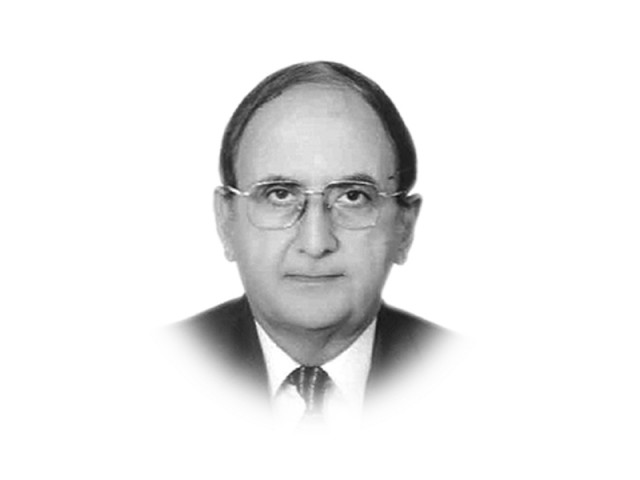Who rules Pakistan?
State institutions and processes cannot adopt clear-cut policies unless the question of who rules Pakistan is settled.

The writer is an independent political and defence analyst
There are people in Pakistan who argue with much conviction that key policy decisions for Pakistan are made in Washington. The United States government, the IMF and the World Bank often force their political and economic preferences on Pakistan.
Looking at the judicial activism on the part of the Supreme Court and the high courts and their periodic attempts to micromanage administrative and political affairs, it may be appropriate to argue that the judges of the Supreme Court and the high courts rule this country. The elected civilian government at the federal level has often found itself under pressure from these courts. One prime minister was removed from office and the other managed to survive. Now, after the end of the PPP rule, two of its ex-prime ministers have been taken to task by the Supreme Court for some of their decisions. Should the state institutions respect each other’s autonomy or should one institution set-right all other state institutions?
The issue of who rules Pakistan becomes more ambiguous when we examine how transnational militant Islamic movements have used violence and terror to establish their exclusive domains of authority at the expense of the Pakistani state.
The Taliban and other militant groups have become so entrenched that they virtually rule parts of the tribal areas and the adjoining districts of Khyber-Pakhtunkhwa. Islamic-sectarian and other militant groups based in mainland Pakistan are linked with the Taliban and facilitate violent activities in addition to pursuing their partisan narrow and dogmatic religious agendas. There are dissident and separatist groups in addition to Islamic-sectarian groups in Balochistan that pursue violence and killing of people as an instrument for asserting their primacy in Balochistan. Karachi is another example of how the state appears helpless in front of various armed gangs, hardline religious outfits, violent political workers, drug mafia and real estate grabbers.
As the Islamabad High Court has taken the initiative to nail down former president General (retd) Pervez Musharraf, most civilian political leaders are happy and blame him for Pakistan’s political ailments. The Senate passed a resolution on April 19 asking for initiation of legal proceedings against him on the charge of high treason that carries the death sentence. Some of the civilian leaders want Musharraf to be tried as a common criminal so as to show that everybody is equal before law.
It is interesting to note two ironies of history. First, Pakistan’s Supreme Court has never delegitimised a military ruler when he was in power. Yahya Khan was declared usurper in April 1972, four months after he was forced out of office. General Pervez Musharraf was declared to have acted in violation of the Constitution in November 2007 by imposing what he described as an emergency, in a Supreme Court judgment delivered July 2009, only 11 months after he lost power.
Second, whereas Musharraf who demonstrated the arrogance of power while in office is now down and under, the key issue is to maintain a distinction between justice and revenge on the part of the political forces who suffered during the Musharraf years. There is a long tradition in Pakistan for seeking ‘exemplary punishment’ or death sentence for former rulers. In all such cases, the argument is that it would establish the supremacy of law in Pakistan.
The caretaker federal government is currently dealing with the uphill task of supporting the Election Commission for holding fair and free elections and providing security to the candidates of the ANP, the MQM and the PPP who are faced with terrorist threats by the Tehreek-e-Taliban Pakistan. Additional administrative and security challenges are to be dealt with in Balochistan and Karachi. Now suddenly, this caretaker government is faced with the unexpected question of the arrest and trial of Pervez Musharraf. The Supreme Court wants the caretaker federal government to explain its position on initiating the trial of Pervez Musharraf on high treason under Article 6 of the constitution.
The latest development threatens to divert the attention of the caretaker federal government from holding fair and free elections. The two long-term challenges also get neglected, which are the troubled economy and religious extremism and terrorism. The political leaders appear more concerned about securing a technical knock-out of Musharraf, preferably before the political governments are installed, rather than coming out with concrete and practical proposals for addressing these problems. The election manifestos are strong on promises and weak on plans of action for fulfilling the promises.
Given Pakistan’s delicate civil-military relations, it is important that the political leaders and civilian state institutions ensure that overenthusiasm to pin down Musharraf does not turn into a propaganda drive against the military. Any strain in civil-military relations can be destabilising, especially when the military is doing election duties and fighting terrorism.
Pakistan’s state institutions and processes cannot adopt clear-cut policies on these issues unless the question of who rules Pakistan is settled for ever. If the state institutions pull in different directions or one state institution takes upon itself the task of rectification of all other institutions of the state, or if the political leaders cannot think beyond their immediate partisan interests, Pakistan is not expected to overcome its acute internal crises even if the elections are held on time.
Published in The Express Tribune, April 22nd, 2013.















COMMENTS
Comments are moderated and generally will be posted if they are on-topic and not abusive.
For more information, please see our Comments FAQ